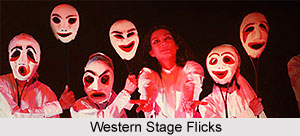Theatre Companies of Western India is the emblematic form of artistic expression exemplifying the tears, fears pain, strain, agony monotony, happiness, bravery, boredom, slavery of the common mass of western India.
The Theatre Companies in Gujarat add to the glitz and glory of Gujrati Theatre. The root of Gujarati theatre is associated with the folk form, Bhavai as in Gujarat, the Bhavai has always been the most important theatrical curio to manifest the unedited realities of life. However the changes from the folk form to the chic form of Gujarati theatre did come gradually. On the mellow Saturday night of the October 29th, back in the year 1853, a play based on the popular and dramatic tale of the Shah Nama was staged at the Grant Road Theatre of Bombay. That was the beginning of the voyage of the Gujarati theatre. That was indeed the beginning of the concept of theatre companies in Gujarat. The journeying of the theatre companies in Gujarat tells the tale of changing traditions in Gujarati natya. Started as just an art form, Gujarati theatre is now one of the medium to manifest the unaltered realisms of society. With immense vivacity, sheer creativity and utter honesty the theatre companies in Gujarat are supporting the Gujarati theatre to stand apart with pride. The journeying of the theatre companies in Gujarat tells the tale of changing traditions in Gujarati natya. Started as just an art form, Gujarati theatre is now one of the medium to manifest the unaltered realisms of society. With immense vivacity, sheer creativity and utter honesty the theatre companies in Gujarat are supporting the Gujarati theatre to stand apart with pride. Rashtriya Kala Kendra, Darpana Academy of Performing Arts, Desi Natak Samaj, Gujarati Natak Mandali, Morbi Arya Subodh Natak Mandali,Rangmandal are some of the celebrated theatre companies of Western India.
 Theatre is a tradition in Maharashtra and the various theatre companies in Maharashtra carried this tradition to the further level of maturity. "Stage is a medium for self expression"-this very truth gains a dimension amidst the art form of Marathi theatre which ideally unifies creativity with innovativeness. The strong tradition of theatre in Maharashtra has been further reshaped by the theatre companies to define the cultural zones in this western state. Tragic themes gain importance in Marathi theatre and the earlier theatre companies in Maharashtra have ideally experimented with tragic and amorous themes as the storyline. There were many experimental plays, which were written in such a way, that they rationalized the old medieval performance. This led to the formation of one of the most important theatre companies in Maharashtra, the professional Bhave Company. That was just the beginning. Marathi play rose in full swing and within no time, other theatre companies in Maharashtra like the Aryoddharaka Company in Poona, the Maharashtra Company and the Shanunagaravasi Company followed the Bhave Company.
Theatre is a tradition in Maharashtra and the various theatre companies in Maharashtra carried this tradition to the further level of maturity. "Stage is a medium for self expression"-this very truth gains a dimension amidst the art form of Marathi theatre which ideally unifies creativity with innovativeness. The strong tradition of theatre in Maharashtra has been further reshaped by the theatre companies to define the cultural zones in this western state. Tragic themes gain importance in Marathi theatre and the earlier theatre companies in Maharashtra have ideally experimented with tragic and amorous themes as the storyline. There were many experimental plays, which were written in such a way, that they rationalized the old medieval performance. This led to the formation of one of the most important theatre companies in Maharashtra, the professional Bhave Company. That was just the beginning. Marathi play rose in full swing and within no time, other theatre companies in Maharashtra like the Aryoddharaka Company in Poona, the Maharashtra Company and the Shanunagaravasi Company followed the Bhave Company.
The theatre companies in Maharashtra were then floated, with an addition of the Hindustani classical music and with the rhythm of dance in Marathi plays that contained mythological and social themes. This became popular instantly. Even historical plays about the famous Marathi heroes like Shivaji and others, began to be written and presented. As these were banned, the Marathi dramatists invented subtle stratagems to present their point of view in allegorical fantasies or in farcical comedies and it was then the theatre companies in Maharashtra induced a novel facet in Marathi theatre whilst making it far more realistic. Alfred Theatrical Company, Natyamanwantar Ltd, Parsee Stage Players, National Centre for the Performing, Grant Road Theatre, Rangbhoomi,Industrial Theatre Company are the several theatre groups in Maharastra.
Elphinstone Dramatic Club was founded by Coonvarji Sorabji Nazir in 1861 is an integral regional wing from the Western theatrical zone, as it passes on the baton of Bombay`s Parsee theatrical tradition. Sorabji Nazir was a student of Elphinstone College. Initially using alumni of the college, it began by presenting English theatre. Some of the names can be mentioned as Shakespeare`s Merchant of Venice and Othello, Mervanji Wadia`s Honeymoon. Dr Dhanjisha Parekh, in the roles of Portia, Desdemona, and Zamora respectively, marked the turning point from stylization to realism in men`s portrayal of female characters. His brother Dr Nasarvanji Parekh was another partner. He eventually became a famous actor, director, and playwright. In the beginning the club staged shows at Grant Road Theatre. Elphinstone Theatrical Company turned professional in 1868, and after 1870 performed at Victoria Theatre. It is remembered for the Gujarati play `Karan Ghelo` in 1868. The young Framji Dadabhai Appu`s acting was lively and realistic as the hero, Karan, who was last Hindu king of Gujarat. He was a Parsi for first time attempted to speak correct Gujarati with proper intonation and stress. The troupe received help from Hindus to present a funeral realistically. Kavasji Contractor played the role of a woman named Rupasundari.




















